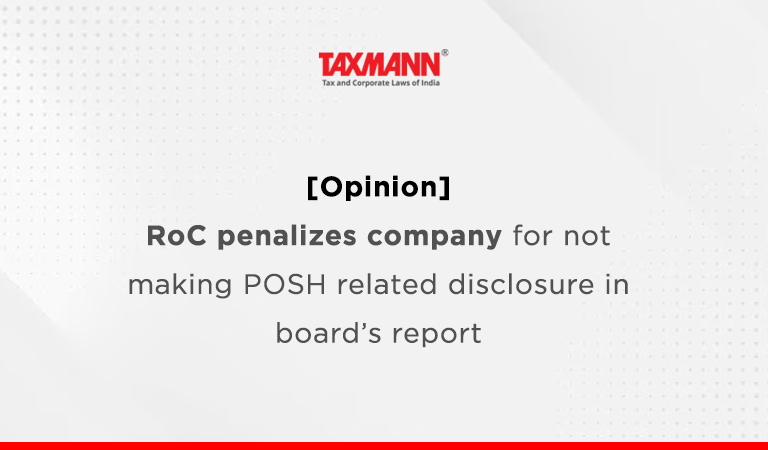[Opinion] RoC penalizes company for not making POSH related disclosure in board’s report
- Blog|News|Company Law|
- 2 Min Read
- By Taxmann
- |
- Last Updated on 22 March, 2023

[2023] 148 taxmann.com 321 (Article)
1. Protection of Women from Sexual Harassment at Workplace Act 2013 (POSH Act 2013)
The Protection of Women from Sexual Harassment at Workplace Act, 2013 (POSH Act 2013) is a landmark legislation in our country superseding the Vishakha Guidelines existed earlier. The POSH Act seeks to protect women from sexual harassment. This law has enabled women to stand up for their rights and assert their autonomy in the workplace. Through this POSH Act, the Government has sought to provide women with a safe and secure working environment and has put in place mechanisms to prevent and redress complaints of sexual harassment.
2. Disclosure relating to the Protection of Women from Sexual Harassment at Workplace Act 2013 (POSH Act 2013) in the board report
Sub-section (3)(q) of section 134 of the Companies Act 2013, specifies that there shall be attached to statements laid before a company in a general meeting, a report by its board of directors, which shall include such other matters as may be prescribed.
In this connection, one of the prescribed items on which the disclosure is required to be made in the board report is that of
“Disclosure under the Sexual Harassment of Women at Workplace (Prevention, Prohibition and Redressal) Act, 2013.”
As per Rules 8 and 8A of the Companies (Accounts) Rules,2014 other than one person Company or small company shall give a statement that the company has complied with the provisions relating to the constitution of Internal Complaint under the Sexual Harassment of women at Workplace (Prevention, Prohibition and Redressal) Act, 2013 to be made with effect from31.07.2018.
3. Required disclosure pursuant to POSH Act in the board report
The company is required to state that the company has in place a policy in line with the requirements of the Sexual Harassment of Women at the Workplace (Prevention, Prohibition &Redressal) Act, 2013. The company has to further disclose that an Internal Complaints Committee (ICC) has been set up to redress complaints received regarding sexual harassment and all employees (permanent, contractual, temporary, trainees) are covered under this policy.
The report is also required to make disclosure/report the number of complaints filed, if any and their disposal under the POSH Act apart from intimating and reporting the matter to the District Officer as per the provisions of the POSH Act. If there have been no complaints, then the report needs to disclose that during the year under review, neither any complaints of sexual harassment were received by it from the Internal Compliance Committee, nor were there any complaints relating thereto which required any disposal thereof.
In case, the company does not have any women employees, yet, under this caption, the company needs to report that the company does not have any woman employees and therefore the POST Act is not applicable to the company as on date.
Click Here To Read The Full Article
Disclaimer: The content/information published on the website is only for general information of the user and shall not be construed as legal advice. While the Taxmann has exercised reasonable efforts to ensure the veracity of information/content published, Taxmann shall be under no liability in any manner whatsoever for incorrect information, if any.

Taxmann Publications has a dedicated in-house Research & Editorial Team. This team consists of a team of Chartered Accountants, Company Secretaries, and Lawyers. This team works under the guidance and supervision of editor-in-chief Mr Rakesh Bhargava.
The Research and Editorial Team is responsible for developing reliable and accurate content for the readers. The team follows the six-sigma approach to achieve the benchmark of zero error in its publications and research platforms. The team ensures that the following publication guidelines are thoroughly followed while developing the content:
- The statutory material is obtained only from the authorized and reliable sources
- All the latest developments in the judicial and legislative fields are covered
- Prepare the analytical write-ups on current, controversial, and important issues to help the readers to understand the concept and its implications
- Every content published by Taxmann is complete, accurate and lucid
- All evidence-based statements are supported with proper reference to Section, Circular No., Notification No. or citations
- The golden rules of grammar, style and consistency are thoroughly followed
- Font and size that’s easy to read and remain consistent across all imprint and digital publications are applied



 CA | CS | CMA
CA | CS | CMA
